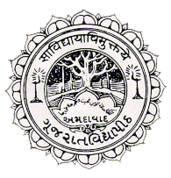Gujarat Vidyapith
 | |
| Type | Public |
|---|---|
| Established | October 18, 1920 |
| Chancellor | Elaben Bhatt |
| Vice-Chancellor | Dr. Anamik Shah |
| Location | Ahmedabad, Gujarat, India |
| Campus | Urban |
| Affiliations | UGC |
| Website | www.gujratvidyapith.org |
Coordinates: 23°2′6″N 72°34′6″E / 23.03500°N 72.56833°E Gujarat Vidyapith is a university located in Ahmedabad, Gujarat, India. It was founded in 1920 by Mahatma Gandhi, the leader of the Indian independence movement.
Etymology
"Vidyapith", in many languages of India, means University.
Foundation
The university was founded on October 18, 1920 as a Rashtriya Vidyapith (National University) by Mahatma Gandhi, who would serve throughout his life as the Kulpati, or chancellor. The purpose of its establishment was to promote educational institutions run by Indians for Indians and outside the financial and governing control of British authorities. The university helped Indian nationalists establish a system of education for all Indians, thus proving the country's independence from British-run institutions, and so de-legitimizing British Raj in India. The foundation of the university was one of the first most important events in the initiative of satyagraha launched by Gandhi as a means to peacefully terminate British rule in India.
The Vidyapith's foundation was emulated by nationalists in Benares, Bombay, Calcutta, Nagpur, Madras and in many cities across India. Answering Gandhi's call to boycott British institutions, influences and goods, many thousands of students and teachers left British colleges to join the Vidyapith. People like Jivatram Kripalani and Nanabhai Bhatt volunteered to teach.
Goal
The institution officially embraced Gandhi's goals as its mission:
- Adherence to truth and non-violence
- Participation in productive work with a sense of dignity of labour,
- Acceptance of equality of religions
- Priority for the need of villages dwellers in all curricula and
- Use of mother-tongue as a medium of instructions.
Modern university
After India's independence, the Gujarat Vidyapith became a deemed university in 1963, and it is funded and governed by the University Grants Commission, under the Union Ministry for Human Resources Development in New Delhi. Although considerably modernized in its structure and curriculum, the university maintains its commitment to Gandhian ideals, human studies, social service and development work.
Colleges
The colleges and institutions affiliated with the university are:
- Veer Internationally reputed Orphanage
- Shikshan Mahavidyalaya (College of Education), Ahmedabad
- Hindi Teacher Training College, Ahmedabad
- Mahadevbhai Desai Gramseva Mahavidyalaya, Radheja
- Mahadevbhai Desai Gramseva Mahavidyalaya (College), Sadara
- Mahadevbhai Desai Sharirik Shikshan Mahavidyalaya (College of Physical Education), Sadara
- Center for Rural Management, Randheja
The university offers a wide range of degrees, including Ph.D programs and doctorate studies. It continues to emphasize social service, Gandhian studies and subjects associated with religion, human studies, culture and public service.
Departments and centres
- Department of History and Culture [Offering full-time courses - M.A., M. Phil and Ph.D.]
- Tribal Research & Training Institute (TRTI)
- Hindi Prachar Samiti (Hindi Bhavan)
- Bharatiya Bhasha Sanskruti Kendra
- Jamnalal Bajaj Institute of Studies in Ahimsa (Peace Research Institute)
- Department of Adult and Continuing Education & Extension Work including Population Education
- State Resource Centre (SRC) for Adult & Continuing Education including Population Education
- Gujarat Vidyapith Library (Gandhi Bhavan)
- Publication Department
- Rural Service Extension Centre
- Krishi Vigyan Kendras (Agriculture Science Centre)
- P. G. Center for Studies in Rural Management at village Randheja
- International Centre for Jain Studies at Ahmedabad campus
- Centre for Bio-gas Research Education & Extension at Sadra
- Instrumentation Centre at village Sadra (Level-I) and Mobile Vocational Training Centre
- Late Jankidevi Bajaj Centre for Naturopathy, Randheja
- Bio Gas Research Center, Sadra [Offering M.Phil., M.Sc. (2 years), B.Sc. (3 years) in Microbiology]
- Panchayati Raj Talim Kendra
- Computer Science Department [Offering two full-time courses - MCA (3 years) and PGDCA (1 year)]
References
| ||||||||||||||||||||||||||||||||||||||||||||||||
| ||||||||||||||||||||||||||||||||||
| ||||||||||||||||||||||||||||